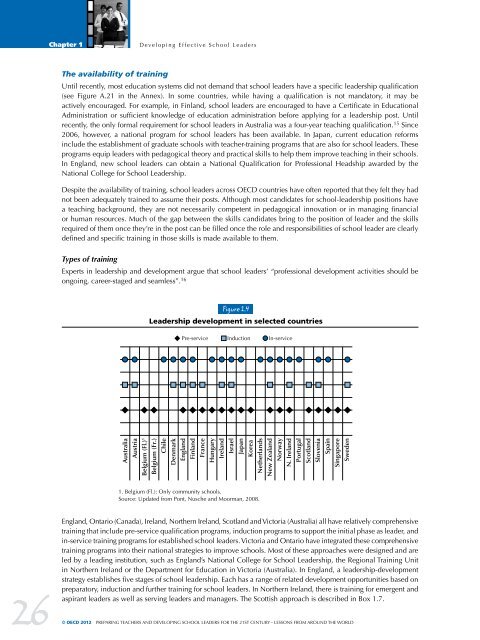Preparing Teachers and Developing School Leaders for the 21st Century
Preparing Teachers and Developing School Leaders for the 21st Century
Preparing Teachers and Developing School Leaders for the 21st Century
You also want an ePaper? Increase the reach of your titles
YUMPU automatically turns print PDFs into web optimized ePapers that Google loves.
26 ©<br />
Chapter 1<br />
The availability of training<br />
developing effective school leaders<br />
until recently, most education systems did not dem<strong>and</strong> that school leaders have a specific leadership qualification<br />
(see figure a.21 in <strong>the</strong> annex). in some countries, while having a qualification is not m<strong>and</strong>atory, it may be<br />
actively encouraged. <strong>for</strong> example, in finl<strong>and</strong>, school leaders are encouraged to have a certificate in educational<br />
administration or sufficient knowledge of education administration be<strong>for</strong>e applying <strong>for</strong> a leadership post. until<br />
recently, <strong>the</strong> only <strong>for</strong>mal requirement <strong>for</strong> school leaders in australia was a four-year teaching qualification. 15 since<br />
2006, however, a national program <strong>for</strong> school leaders has been available. in Japan, current education re<strong>for</strong>ms<br />
include <strong>the</strong> establishment of graduate schools with teacher-training programs that are also <strong>for</strong> school leaders. <strong>the</strong>se<br />
programs equip leaders with pedagogical <strong>the</strong>ory <strong>and</strong> practical skills to help <strong>the</strong>m improve teaching in <strong>the</strong>ir schools.<br />
in engl<strong>and</strong>, new school leaders can obtain a national Qualification <strong>for</strong> Professional headship awarded by <strong>the</strong><br />
national college <strong>for</strong> school leadership.<br />
despite <strong>the</strong> availability of training, school leaders across oecd countries have often reported that <strong>the</strong>y felt <strong>the</strong>y had<br />
not been adequately trained to assume <strong>the</strong>ir posts. although most c<strong>and</strong>idates <strong>for</strong> school-leadership positions have<br />
a teaching background, <strong>the</strong>y are not necessarily competent in pedagogical innovation or in managing financial<br />
or human resources. Much of <strong>the</strong> gap between <strong>the</strong> skills c<strong>and</strong>idates bring to <strong>the</strong> position of leader <strong>and</strong> <strong>the</strong> skills<br />
required of <strong>the</strong>m once <strong>the</strong>y’re in <strong>the</strong> post can be filled once <strong>the</strong> role <strong>and</strong> responsibilities of school leader are clearly<br />
defined <strong>and</strong> specific training in those skills is made available to <strong>the</strong>m.<br />
Types of training<br />
Experts in leadership <strong>and</strong> development argue that school leaders’ “professional development activities should be<br />
ongoing, career-staged <strong>and</strong> seamless”. 16<br />
Australia<br />
Austria<br />
Figure 1.4<br />
<strong>Leaders</strong>hip development in selected countries<br />
Pre-service Induction<br />
1. Belgium (Fl.): Only community schools.<br />
Source: Updated from Pont, Nusche <strong>and</strong> Moorman, 2008.<br />
In-service<br />
Belgium (Fl.) 1<br />
Belgium (Fr.)<br />
Chile<br />
Denmark<br />
Engl<strong>and</strong><br />
Finl<strong>and</strong><br />
France<br />
Hungary<br />
Irel<strong>and</strong><br />
Israel<br />
Japan<br />
Korea<br />
Ne<strong>the</strong>rl<strong>and</strong>s<br />
New Zeal<strong>and</strong><br />
Norway<br />
N. Irel<strong>and</strong><br />
Portugal<br />
Scotl<strong>and</strong><br />
Slovenia<br />
Spain<br />
Singapore<br />
Sweden<br />
engl<strong>and</strong>, ontario (canada), irel<strong>and</strong>, nor<strong>the</strong>rn irel<strong>and</strong>, scotl<strong>and</strong> <strong>and</strong> victoria (australia) all have relatively comprehensive<br />
training that include pre-service qualification programs, induction programs to support <strong>the</strong> initial phase as leader, <strong>and</strong><br />
in-service training programs <strong>for</strong> established school leaders. victoria <strong>and</strong> ontario have integrated <strong>the</strong>se comprehensive<br />
training programs into <strong>the</strong>ir national strategies to improve schools. Most of <strong>the</strong>se approaches were designed <strong>and</strong> are<br />
led by a leading institution, such as Engl<strong>and</strong>’s National College <strong>for</strong> <strong>School</strong> <strong>Leaders</strong>hip, <strong>the</strong> Regional Training Unit<br />
in nor<strong>the</strong>rn irel<strong>and</strong> or <strong>the</strong> department <strong>for</strong> education in victoria (australia). in engl<strong>and</strong>, a leadership-development<br />
strategy establishes five stages of school leadership. each has a range of related development opportunities based on<br />
preparatory, induction <strong>and</strong> fur<strong>the</strong>r training <strong>for</strong> school leaders. in nor<strong>the</strong>rn irel<strong>and</strong>, <strong>the</strong>re is training <strong>for</strong> emergent <strong>and</strong><br />
aspirant leaders as well as serving leaders <strong>and</strong> managers. <strong>the</strong> scottish approach is described in Box 1.7.<br />
OECD 2012 PreParing teachers <strong>and</strong> develoPing school leaders <strong>for</strong> <strong>the</strong> <strong>21st</strong> century – lessons froM around <strong>the</strong> World


